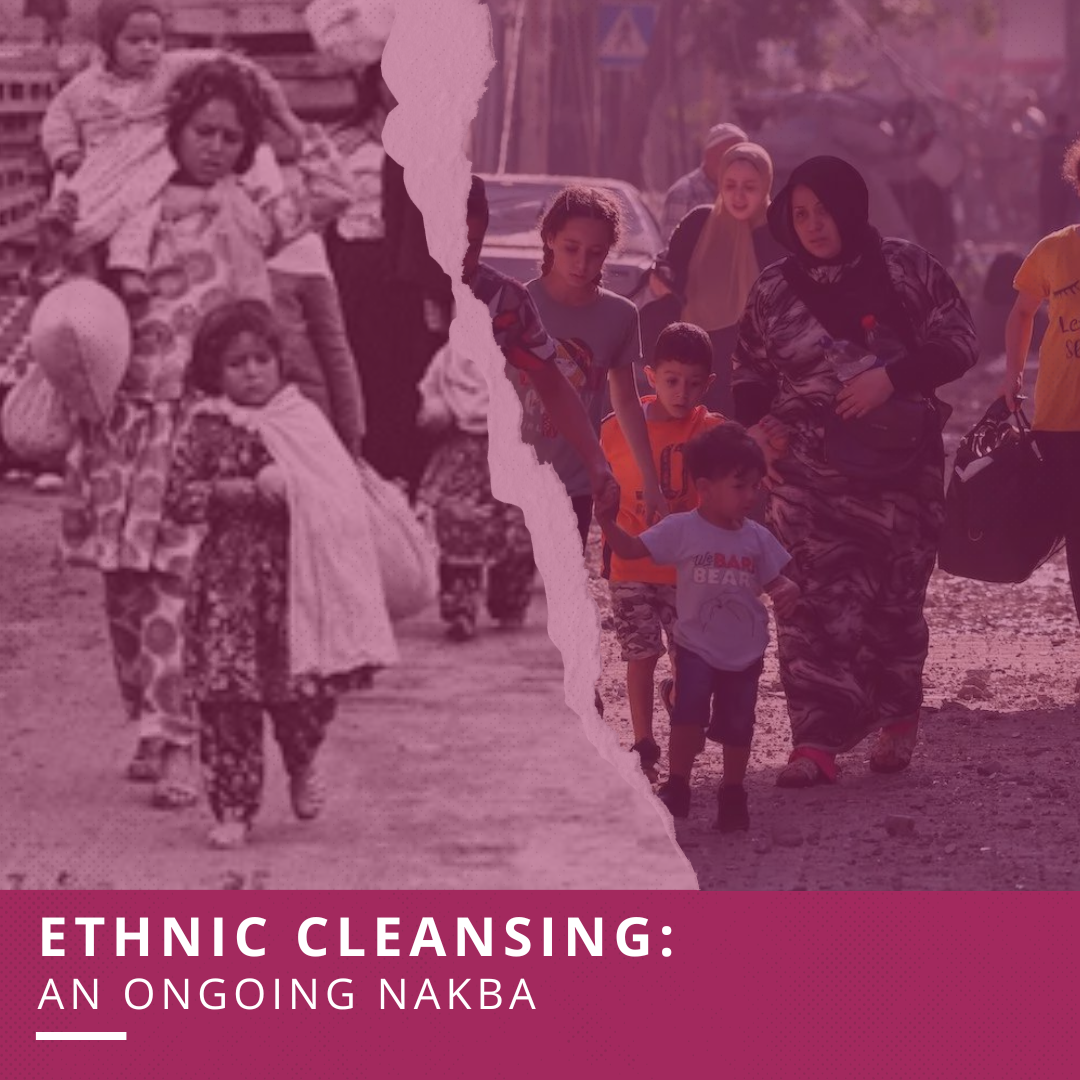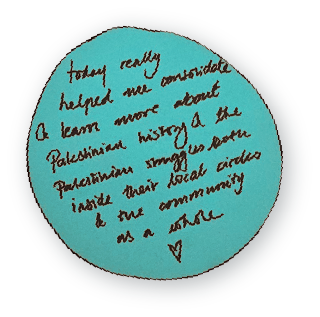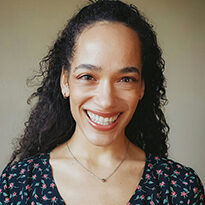Ethnic Cleansing: An Ongoing Nakba

The Nakba, or ‘catastrophe’ in Arabic refers to the ongoing ethnic cleansing of Palestine by Israeli forces, following the forcible displacement of 750,000 Palestinians (almost half the population) in 1947-49 in order to establish the state of Israel, when:
- More than 78% of historic Palestine was taken by Israel
- Around 15,000 Palestinians were killed in over 70 massacres
- Around 530 villages and cities were ethnically cleansed and destroyed.
What is ethnic cleansing?
The term ‘ethnic cleansing’ is related to genocide. It surfaced in the context of the 1990’s conflict in former Yugoslavia. It has been acknowledged in judgements and indictments of the International Criminal Tribunal for the former Yugoslavia and used in resolutions of the UN Security Council and the General Assembly.
Ethnic cleansing has been defined by a UN Commission of experts as ‘rendering an area ethnically homogeneous by using force or intimidation to remove persons of given groups from an area.’ It is ‘a purposeful policy designed by one ethnic or religious group to remove by violent and terror-inspiring means the civilian population of another ethnic or religious group from certain geographic areas.’
Coercive practices to remove the civilian population include:
- murder
- torture
- arbitrary arrest and detention
- extrajudicial executions
- rape and sexual assaults
- severe physical injury to civilians
- confinement of civilian population in ghetto areas
- forcible removal
- displacement and deportation of civilian population
- deliberate military attacks or threats of attacks on civilians and civilian areas
- use of civilians as human shields
- destruction of property
- robbery of personal property
- attacks on hospitals, medical personal and locations with the Red Cross/Red Crescent emblem, among others
While ethnic cleansing has not been recognised as an independent crime under international law, forcible transfer is strictly prohibited under Article 49 of the Fourth Geneva Convention and is recognised as a grave breach that can be prosecuted as an international crime. The coercive practices listed above constitute crimes against humanity. These acts can be assimilated to specific war crimes and can also fall within the meaning of the Genocide Convention.
What is happening in Gaza today?
Israel’s current assault on Gaza is an escalation of the ongoing Nakba and threatens to be the largest mass expulsion of Palestinians since 1948.
For over 16 years, 2.2 million Palestinians have been confined to the Gaza Strip, forced to live under a suffocating blockade that has led to a collapsed economy, 70 percent youth unemployment, widely contaminated water and a buckling health care system. As early as 2012, the UN warned that Gaza could become a place unfit to live by 2020.
In October 2023, Israel declared a ‘complete siege’ on Gaza, bombing it from the land, sea and air, killing and injuring thousands of Palestinians, many of them children, and cutting off power, food, water and medical supplies for its 2.3 million inhabitants.
On 13 October, Israel issued an evacuation order to the entire population of 1.1 million people in northern Gaza, which the UN Special Rapporteur on the human rights of internally displaced persons condemned as a crime against humanity. Israel has since ordered the Palestinians living in Khan Younis, the largest city in the south of Gaza to leave their homes.
At least 70% of the population has been forcibly displaced and 45 percent of Gaza’s housing has been damaged or destroyed. In addition to razing entire residential apartment blocks to the ground, Israel has targeted hospitals, bakeries, universities, schools, places of worship, and water and sanitation facilities.
On 12 November, the World Health Organisation (WHO) reported at least 137 attacks on healthcare facilities. WHO has also said that Shifa Hospital is no longer really a hospital, but a ‘death zone’.
Dr Ghassan Abu Sitta, a plastic and reconstructive surgeon, who was forced to leave Gaza after treating the wounded at Al Shifa and Al Ahli hospitals, says: ‘For me, what has made this war different than all the other wars…is the way that the destruction of the health system has been the main thrust of the military strategy.’
Israel’s plans to ethnically cleanse Gaza
Since its establishment in 1948, Israel has pursued policies and practices that treat Palestinians as a ‘demographic threat’ and aim to ensure Israel’s maximum control over the land of historic Palestine with the minimum number of Palestinians. Demographic manipulation, population transfer, and the systematic denial of the right of return of Palestinian refugees and exiles are integral to Israel’s settler colonial and apartheid regime.
The UN Special Rapporteur on the occupied Palestinian territory has stated that Israel already carried out mass ethnic cleansing ‘under the fog of war’ in the 1948 Nakba and the 1967 Naksa, warning that what we are witnessing in Gaza today is on a larger scale: ‘Again, in the name of self-defence, Israel is seeking to justify what amounts to ethnic cleansing.’
On the same day as Israel’s military evacuation order to the entire population of northern Gaza, an Israeli Intelligence Ministry document, which was leaked to the media, referred to the expulsion of all Palestinians from Gaza, proving that talks about moving the population forcibly are happening at an official policy level.
What Israeli officials have said:
Israel’s Minister of Energy and Infrastructure, Israel Katz: “All the civilian population in Gaza is ordered to leave immediately. We will win. They will not receive a drop of water or a single battery until they leave the world.”
Israel’s Minister of Foreign Affairs, Eli Cohen: “At the end of this war, not only will Hamas no longer be in Gaza, but the territory of Gaza will also decrease.”
Israeli general, Giora Eiland: “The international community is warning us against a severe humanitarian disaster and severe epidemics. We must not shy away from this. After all, severe epidemics in the south of Gaza will bring victory closer.”
Israeli Knesset member, Ariel Kallner: “Right now, one goal: Nakba! A Nakba that will overshadow the Nakba of ’48. Nakba in Gaza and Nakba to anyone who dares to join!”
What is happening in the West Bank?
The mass displacement in Gaza coincides with increased settler and military attacks on Palestinians in the West Bank, where Israel is also accelerating its colonisation of Palestinian land.
Armed settlers and Israeli soldiers have attacked Palestinian Bedouin villages, telling residents they have one hour to either leave or be killed. This has become the largest displacement of Palestinian Bedouins since 1972. Eight entire Palestinian villages, with 472 people, were displaced in less than two weeks in October 2023, while 6 others were partially depopulated in the same time period.
In September 2023, the UN published an alarming report stating that settler violence had displaced 1,105 Palestinians from 28 communities since 2022. The report said that Palestinian communities were reporting more incidences of settler violence, as well as more severe violence. This violence has only gone up since 7 October 2023.
International responsibility for Israel’s settler colonial policies and practices
On 12 October, Palestinian human rights organisations, Al Haq, Al Mezan and PCHR issued an urgent appeal to UN Special Procedures and the Commission of Inquiry asserting that forcible transfer and the denial of the right of Palestinian return are ‘the hallmarks of Israel’s settler colonial policies and practices’, while urging them to intervene to ‘prevent mass ethnic cleansing, masquerading as evacuation.’
BADIL Resource Center for Palestinian Residency and Refugee Rights has similarly stated that the international community has an immediate responsibility to intervene to stop Israel’s ethnic cleansing today and that ‘any delay in implementing practical measures constitutes complicity and/or participation in the ongoing Nakba.’
Hub
Palestine 101
Learn the basics

